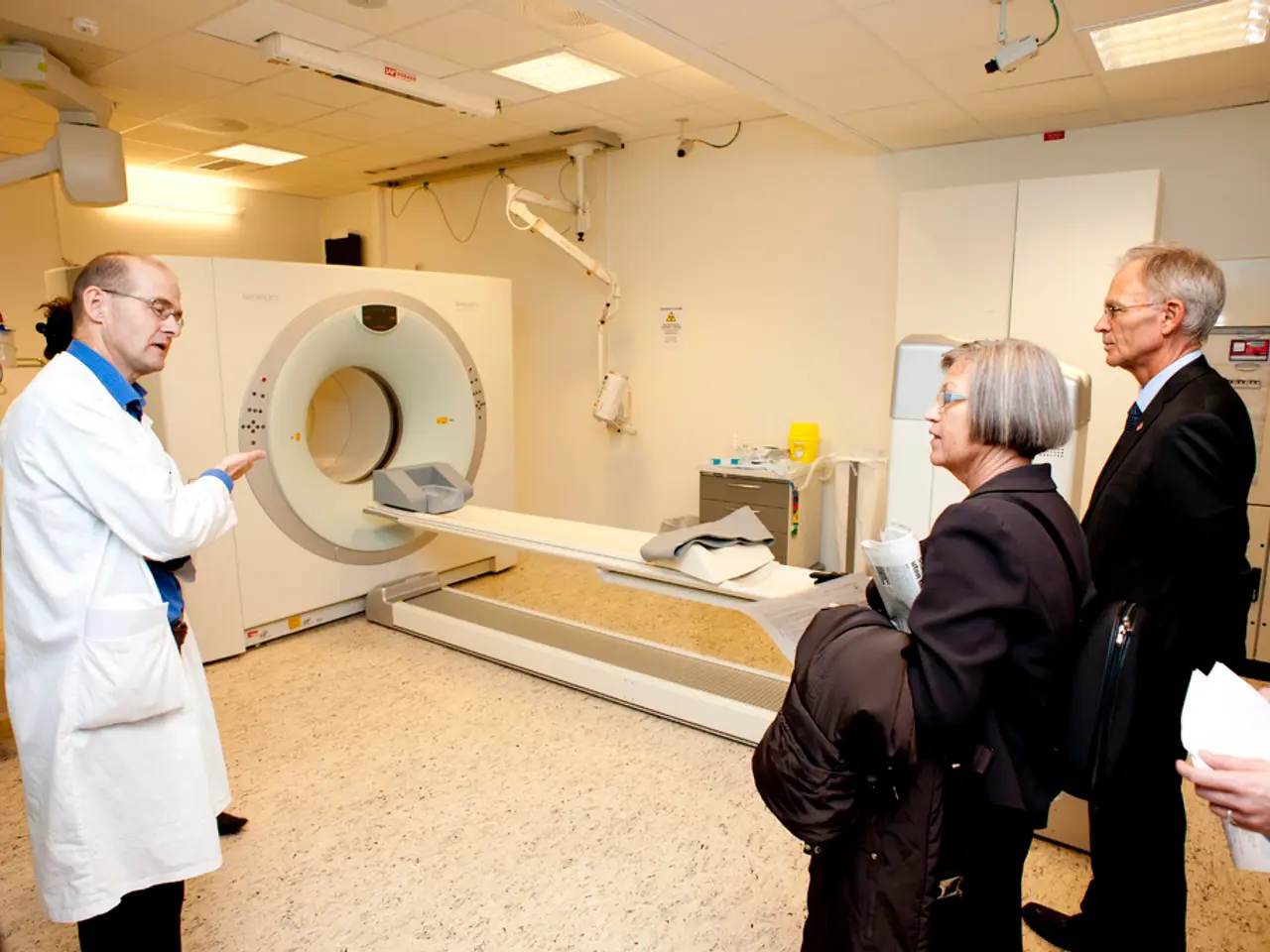Governments enact legislation safeguarding psychological information amassed by technological devices
In the rapidly evolving world of neurotechnology and artificial intelligence (AI), concerns about the potential threats to human identity and autonomy have emerged. The United Nations Educational, Scientific and Cultural Organization (UNESCO) has highlighted this issue, warning of the risks that these technologies could pose [1].
On a more local level, some states in the United States are taking action to safeguard neural data. In Colorado, California, and Montana, the spirit of the laws is to protect the neural data itself, rather than regulating any specific algorithm or AI that might use it [2]. These states have recently mandated the safeguarding of brain data collected by devices outside of medical settings.
One significant development is the American Medical Association's (AMA) endorsement of comprehensive protections for neural data collected by neurotechnologies. This policy supports legislative and regulatory actions to safeguard privacy and security, emphasizing nondiscrimination and fair access to neurotechnology [3].
Montana has led the way, enacting Senate Bill 163, which amends the state's Genetic Information Privacy Act to protect data collected from the nervous system. This law requires initial express consent to collect or use neural data and separate consent or the ability to opt out before disclosing that data to a third party [4].
Elsewhere, Chile became the first country to adopt a constitutional amendment for neurorights in 2021. This amendment prioritizes human rights in the development of neurotechnology and the collection of neural data [5].
As AI continues to advance, its ability to identify patterns in brain data is revolutionising the field of neurosurgery. However, the contribution of a person's neural data on an AI training set should be voluntary [6]. This is a concern shared by several Democratic members of the U.S. Senate Committee on Commerce, Science, and Transportation, who have asked the Federal Trade Commission to investigate whether companies are exploiting consumers' brain data [7].
The Neurorights Foundation has reported that 29 out of 30 companies with neurotechnology products that can be purchased online have access to brain data, providing no meaningful limitations to this access [8]. Almost all of these companies can share data with third parties.
Companies like Elon Musk's Neuralink and Synchron, funded by Bill Gates and Jeff Bezos, are among those with clinical trials underway for devices implanted in the brain [9]. In June, the AMA called for greater regulation of neural data [10].
Welle, from KFF Health News, supports federal regulations in addition to the new state laws for neural data protection [11]. Montana state Sen. Daniel Zolnikov views Montana's neural data protection law as a blueprint for a national neural data protection law [12].
However, as of now, there are no specific federal regulations exclusively focused on neural data protection in the United States. Headphones, earbuds, and other wearable consumer products that aim to improve sleep, focus, and aging by measuring electrical activity and sending the data to an app on users' phones are included [13]. A business must provide a way for consumers to delete their data when operating in all three states (Colorado, Montana, and California).
Ongoing discussions and proposals, such as the National Institute of Standards and Technology (NIST) updating its Privacy Framework, could pave the way for future federal action [2]. The AMA's policy also calls for legislative and regulatory support, suggesting potential future federal initiatives to address neural data privacy if supported by broader legislative efforts.
In conclusion, while there are currently no specific federal regulations for neural data protection, there are both state-level protections and organizational calls for national action, which may lead to future developments in this area. As neurotechnology and AI continue to evolve, it is crucial to ensure that the protection of human identity and autonomy remains a priority.
References: [1] UNESCO. (2021). Recommendation on the ethics of artificial intelligence. Retrieved from https://en.unesco.org/commissions/scientific/2021/unesco-recommendation-ethics-artificial-intelligence [2] National Institute of Standards and Technology. (n.d.). Privacy Framework. Retrieved from https://www.nist.gov/privacy-framework [3] American Medical Association. (2021). Adopted policy H-181.206: Neurotechnology. Retrieved from https://www.ama-assn.org/ama/pub/about-ama/our-people/ama-council/ama-council-meetings/2021-06-16-council-report/ama-council-report-2021-06-16-h-181-206-neurotechnology [4] Montana Legislature. (2021). Senate Bill 163. Retrieved from https://leg.mt.gov/bills/2021/billpdf/SB0163.pdf [5] Chilean Constitutional Convention. (2021). Approval of the new Chilean Constitution. Retrieved from https://www.rpp.cl/noticias/politica/constitucion-chile-2021-aprobada-el-nuevo-texto-constitucional-318115/ [6] World Economic Forum. (2021). Artificial intelligence and neurotechnology: The ethics of brain data. Retrieved from https://www.weforum.org/agenda/2021/06/ethics-of-brain-data-neurotechnology-artificial-intelligence/ [7] United States Senate Committee on Commerce, Science, and Transportation. (2021). Letter to the Federal Trade Commission. Retrieved from https://www.commerce.senate.gov/imo/media/doc/21-06_FTC_Letter_to_Khan_on_Brain_Data.pdf [8] Neurorights Foundation. (2021). The Neurorights Report: Volume 1. Retrieved from https://neurorights.org/wp-content/uploads/2021/05/Neurorights-Report-Vol-1.pdf [9] Neuralink. (n.d.). Clinical trials. Retrieved from https://neuralink.com/clinical-trials [10] American Medical Association. (2021). Adopted policy H-181.206: Neurotechnology. Retrieved from https://www.ama-assn.org/ama/pub/about-ama/our-people/ama-council/ama-council-meetings/2021-06-16-council-report/ama-council-report-2021-06-16-h-181-206-neurotechnology [11] KFF Health News. (2021). Welle: Neurorights and the future of neurotechnology regulation. Retrieved from https://www.kff.org/welle/article/welle-neurorights-and-the-future-of-neurotechnology-regulation/ [12] Montana Public Radio. (2021). Montana's neural data protection law could be a blueprint for the nation. Retrieved from https://mtpr.org/post/montanas-neural-data-protection-law-could-be-blueprint-nation [13] Colorado, Montana, and California have recently required safeguarding of brain data collected by devices outside of medical settings. (n.d.). Retrieved from https://www.pbs.org/newshour/health/colorado-montana-and-california-require-safeguarding-of-brain-data-collected-by-devices-outside-of-medical-settings
- The United Nations Educational, Scientific and Cultural Organization (UNESCO) has warned of potential risks that neurotechnology and artificial intelligence (AI) could pose to human identity and autonomy.
- Some states in the United States, including Colorado, California, and Montana, have taken action to safeguard neural data, with laws focused on protecting the data itself rather than specific algorithms or AI.
- These states have mandated the safeguarding of brain data collected by devices outside of medical settings and require initial express consent to collect or use neural data.
- Chile became the first country to adopt a constitutional amendment for neurorights in 2021, prioritizing human rights in the development of neurotechnology and the collection of neural data.
- AI's ability to identify patterns in brain data is revolutionizing the field of neurosurgery, but the contribution of a person's neural data on an AI training set should be voluntary.
- The Neurorights Foundation reported that nearly all companies with neurotechnology products access brain data, with no meaningful limitations to this access.
- Companies like Elon Musk's Neuralink and Synchron, funded by Bill Gates and Jeff Bezos, are among those with clinical trials underway for devices implanted in the brain.
- There are ongoing discussions and proposals for federal action in the United States, such as the National Institute of Standards and Technology (NIST) updating its Privacy Framework, which could lead to future federal initiatives to address neural data privacy.




